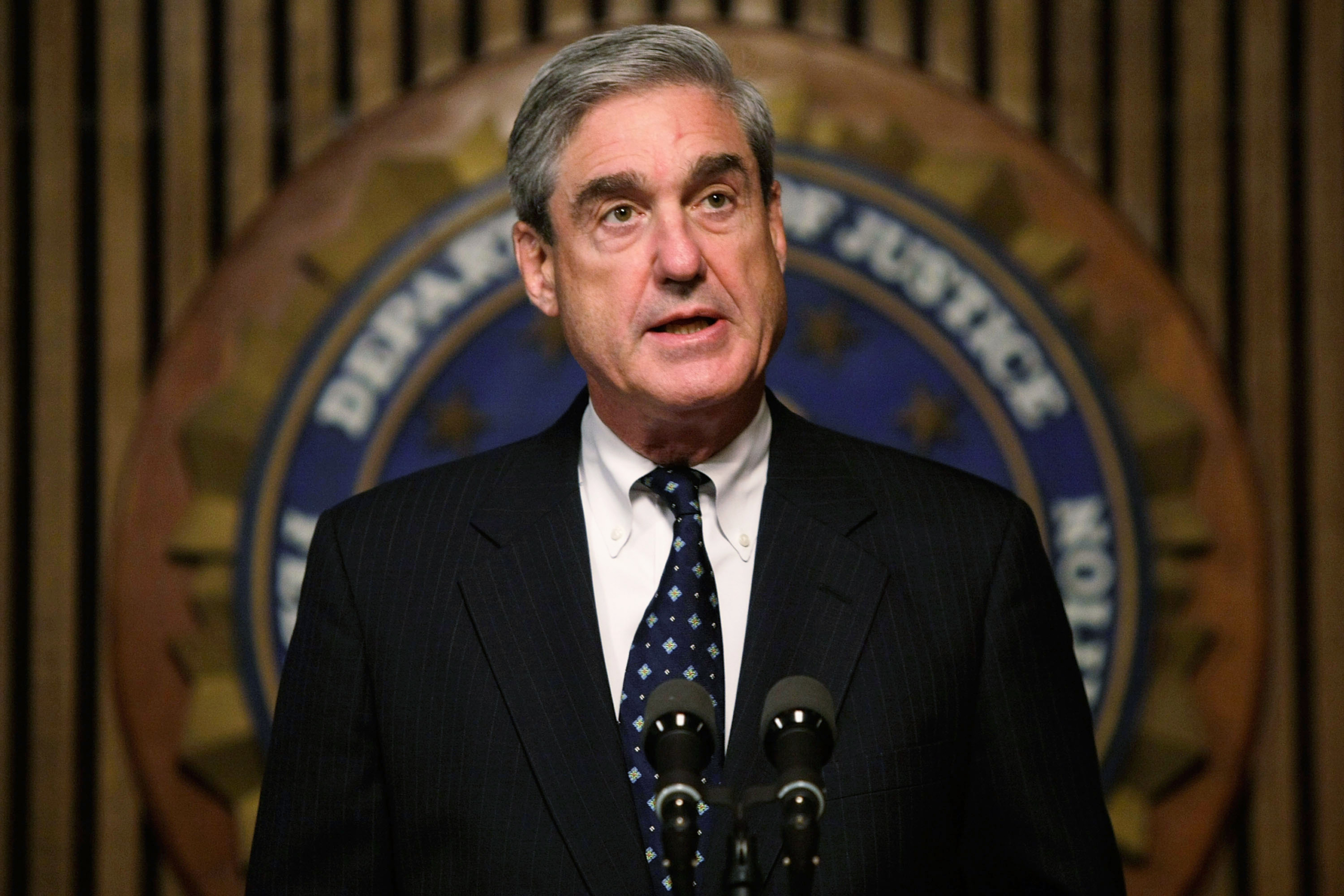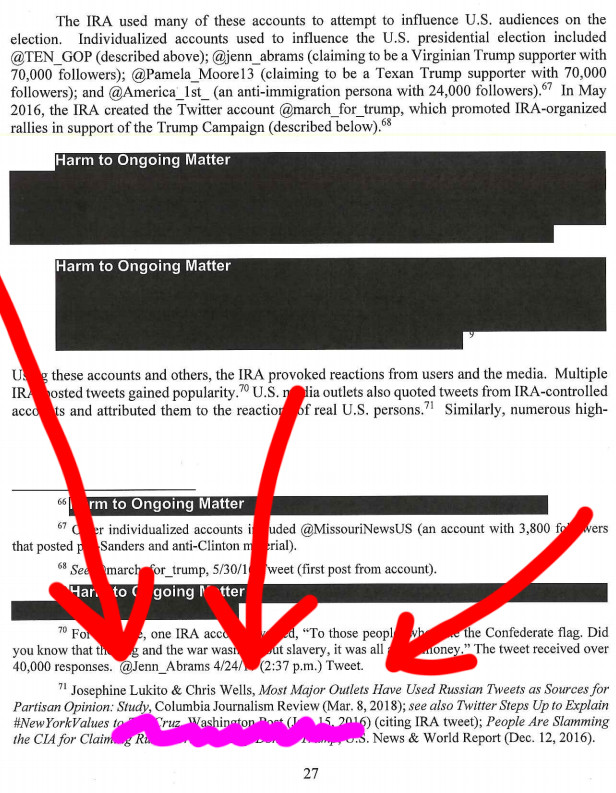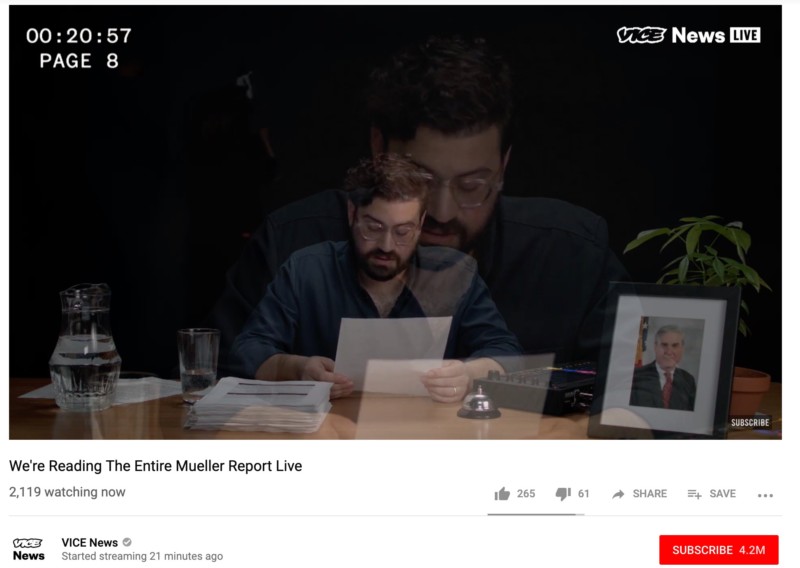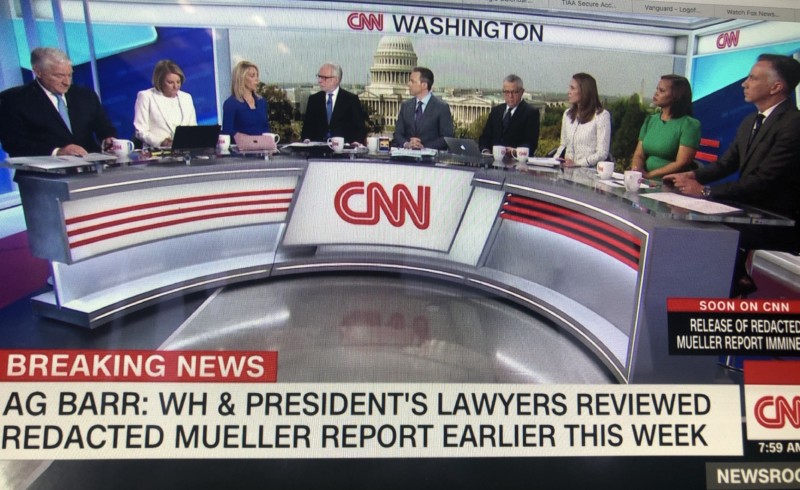Sign up for The Media Today, CJR’s daily newsletter.
Did William Barr, the attorney general, mislead in his summary of Special Counsel Robert Mueller’s report? Will whistleblowers, even news outlets, be exposed in the document? Did the press get ahead of itself in reporting on Trump and Russia?
The redacted Mueller report has now been officially released. As reporters scrambled to read and make sense of the 448-page PDF, CJR live-blogged the coverage of Mueller live. It’s an enormous media story, even for Donald Trump’s administration, which sees itself as much a media operation as a national government.
We looked for who reported first and who did it right, for misinformation surrounding the report, and at how media outlets in a polarized world reported the same news very differently. And we’ll be teasing out the themes worthy of more attention in the coming days.
Surveying the damage
Maybe it’s best for all of us that there was no Trump press conference today.
The president showed up in public twice Thursday, one of the most high-stakes days of his presidency, but he took questions from the press in neither appearance. Once, he made a few prepared remarks; the other, he walked to a plane for his Easter holiday.
Given what we learned in the Mueller report about the tendency of Trump and his acolytes to lie to and about the press, it’s unlikely that any news conference would have been worth the effort.
Until Mueller, the battle between Trump and the press had been a frustrating standoff: media outlets reported damning things about the administration, Trump and his lackeys claimed they were wrong or exaggerated or fake, prompting reporters, or sometimes their editors, to firmly stand by their stories. Things got muddled, neither side emerged clean.
The Mueller report, among many other things, exposed those Trump lies as what they were, which were cynical attempts to discredit bad news even though it was true. Time and again, the report cited reporting by the Times, Post, CNN, and others, and provided outside, third-party proof that the media was right and Trump was wrong. It wasn’t nearly as muddy as Trump would have had us believe.
Particularly egregious was the admission by Sarah Huckabee Sanders, the White House press secretary, that she had made up part of a statement to the press in the briefing room in 2017. I remember her claim at the time (that she personally had spoken to numerous FBI officials, who told her they had lost faith in James Comey), and thought then that it was ridiculous. But, there we were.
And now, here we are. Sanders has lost whatever speck of credibility she once had and Trump’s claims of fake news have to be weighed against the findings of Mueller. We’re left to survey the damage he’s done to the credibility of a free press in America.
The implications could be huge. Mueller could, for example, finally be the turn that convinces a surprisingly credulous White House press corps—credulous in spite of everything we’ve seen—that Trump’s words have lost their value, that his history, now enshrined in Mueller, of lying to and about the press to further his interests and save his presidency should now be reflected in everything we say about him.
It was he said, we said. Now, Mueller has spoken, and he lost.—Kyle Pope, 5:40pm
A temperature shift on Fox
Coverage on Fox today was, for the most part, even-keeled. Throughout the day, hosts and pundits examined key parts of the Mueller report, spending significant time reiterating that it did not offer evidence of collusion. Some openly conceded that the details within it were a bad look for Trump, regardless of their illegality. Criminal defense lawyer Bob Bianchi, speaking to Fox News’s Shep Smith, criticized Barr’s press conference this morning, saying he was “trying to be a cheerleader” for Trump when he mentioned the president’s personal feelings about the investigation. “The president never availed himself to be interviewed to express that,” said Bianchi. “So where is the attorney general coming up with what his emotional temperature was? It was a gratuitous comment, not a lawyerly one.”
Smith agreed and noted that for Trump, Barr’s performance during the press conference was a positive one. “But if I’m one seeking the truth about what’s in the report, in many cases, we were deceived,” Smith said. He went on to challenge Barr’s characterization of Trump as having willfully cooperated in the special counsel investigation, noting that Trump was “openly trying to keep people from cooperating and openly trying to keep his own testimony from them. That is not full cooperation by anyone’s definition,” Smith said.
Earlier in the day, just after Barr spoke, Chris Wallace had this to say about Barr: “You got into this very curious area where the attorney general seemed almost to be acting as the counselor for the defense, the counselor for the president rather than the attorney general.” Wallace said Barr’s mention of Trump’s emotional response (his anger, the sentiment that it was unfair) amounted to his attempt to make a case for Trump.—Alexandria Neason, 5:30pm
Calls for impeachment
Chris Matthews, host of MSNBC’s “Hardball,” spoke with Brian Williams about the Barr cover-up theory. “If Barr had said a month ago, ‘I disagree with the Mueller report on obstruction of justice,’ it would have been the reigning headline the past month,” Matthews said. “It was a stroke of political brilliance that he waited.” Barr’s admission this morning, minutes before the redacted report went live, that he “disagreed,” could “soften the landing,” Matthews said.
Trump has remained insistent that he owes Russia nothing for his success in 2016, and that the Mueller report proves this definitively. “Where does this leave us?” Williams asked.
“With obstruction of justice and collusion,” Matthews said, before urging for Trump’s impeachment.
Earlier, in a press conference, Jerrold Nadler, House Judiciary Committee Chairman, called on Congress to hold Trump accountable for his actions. When asked if he recommended impeachment proceedings, he said that the report “was probably written with the intent to provide Congress a roadmap.”—Amanda Darrach, 5:15pm
Mueller report props up reporting
In June 2017, Trump ordered Don McGahn, then White House counsel, to fire Mueller. McGahn refused to comply. In January 2018, The New York Times reported that exchange. After the story dropped, Trump called it “fake news, folks.” It was “a typical New York Times fake story,” he said.
Today, the Mueller report confirmed that this story was true. As several prominent reporters, including the Times‘s Eric Lipton, have observed, the report points to a clear, broader pattern: time and again, reporters on the Mueller beat nailed stories about matters of interest to the special counsel, only for Trump to vigorously deny them. In cases like the McGahn story, Trump went further than his habitual public cries of “fake news”: Mueller states that the president and his aides repeatedly leaned on McGahn to refute the Times‘s story. McGahn repeatedly said he would not.
The McGahn scoop was not the only example of reporters—from the Times and The Washington Post; from Bloomberg and CNN; the list goes on—getting the goods ahead of time. Mueller confirmed a great deal of prior reporting, including at least one claim that had previously been retracted. In January, the Times reported that Paul Manafort told Rick Gates to share polling data with Konstantin Kilimnik, who, it was understood, would pass it on to Oleg Deripaska, the Russian oligarch. The Times corrected its story to remove this reference to Deripaska—but according to Mueller’s report, Gates did think Deripaska was an intended recipient.
The key takeaway here isn’t journalistic self-congratulation; some details in Mueller’s report were previously misreported; others were altogether new. It’s the many, many times Trump and his minions lied to the press about accurate reporting. Given the destructive power of those lies, it is important to remind the public that journalists—unlike the president and his allies—were actually vindicated by the Mueller report.—Jon Allsop, 4:25pm
MisInfoWars
On the social media platforms that helped promote disinformation during the 2016 campaign, there was… disinformation about the Mueller report. The second result in a search for “Mueller” on Facebook was coverage by far-right site Breitbart. Twitter’s #MuellerReport hashtag was comparatively muted and sane, though it intermingles opinions by blue-checked celebrities with tweets by reporters and subject experts, making it difficult to tell whose take is normal. YouTube’s only promoted news video about the coverage on its home page was from Fox News, the president’s favorite network, and a click on the Fox link immediately leads to a sidebar filled with videos by right-wing personalities like frequent Infowars guest Dan Bongino, The Hoover Institute’s Victor Davis Hanson, and Fox’s own Tucker Carlson. A second click and the recommended videos included far-right outlet The Daily Wire. (An actual search for “Mueller” produced conventional cable networks and broadcasters.) But the real hive of scum and villainy was Instagram, where #muellerreport immediately brought up corkboard-and-string posts from QAnon conspiracy theorists, alt-right Pepe memes, and photoshops of Donald Trump as Superman.—Sam Thielman, 4:10pm
A mystery deepens
Remember the BuzzFeed scoop that Mueller’s team disputed? In January, BuzzFeed’s Jason Leopold and Anthony Cormier reported that President Trump had instructed his personal lawyer, Michael Cohen, to lie to Congress about negotiations to build a Trump tower in Moscow—even as he repeatedly told the public he had no business deals in Russia. According to the BuzzFeed story, Trump supported a plan devised by Cohen to visit Russia during the election to meet personally with Russian president Vladimir Putin. BuzzFeed reported that, according to Mueller, Cohen’s false claim was an attempt to “minimize links between the Moscow Project and Individual 1”—understood to refer to the president. After the BuzzFeed story went live, Peter Carr, a spokesperson for Robert Mueller, disputed it in a very rare public statement: “BuzzFeed’s description of specific statements to the Special Counsel’s Office, and characterization of documents and testimony obtained by this office, regarding Michael Cohen’s Congressional testimony are not accurate,” Carr said.
The Mueller report itself does not refer to the conflict between BuzzFeed and the Mueller team, but does say that Cohen told the counsel that, while Cohen made it clear with the president that he’d stay on message during his testimony, the president had not explicitly instructed him to lie. “Cohen believed they both understood would require false testimony,” writes Mueller in the report. This contradicts language used in the BuzzFeed story.—Alexandria Neason, 3:46pm
Meanwhile, in the rest of the country…
Yesterday evening, The New Yorker co-published an investigation of the NRA by The Trace’s Mike Spies. Through his reporting, Spies concludes, “a small group of N.R.A. executives, contractors, and venders has extracted hundreds of millions of dollars from the nonprofit’s budget, through gratuitous payments, sweetheart deals, and opaque financial arrangements.” This morning, Stephanie Gent, a gun safety advocate, shared the story with a plea: “Before this Barr bonanza happens please do yourself a favor and read the fascinating investigation.”
Have you done yourself that favor? Probably not:
Sending my best to anyone publishing a non-Mueller-related story on the internets this morning
— Joshua Benton (@jbenton) April 18, 2019
This morning, Reporters Without Borders released its annual World Press Freedom Index (the US dropped three spots). In more than three-quarters of countries, RWB characterizes the situation as either “problematic,” “difficult,” or “very serious.” New York barred ICE agents from making warrantless arrests inside courthouses. Rick Perry’s departure from the Department of Energy appears imminent, according to Bloomberg. USA Today touted the impacts of its recent “Deadly Deliveries” investigation into maternal death, which disproportionately impacts black mothers.
As clamor around the Mueller report grew, The Washington Post reported the sale of the National Enquirer from AMI to Hudson News CEO James Cohen, who also gets the Globe and National Examiner for $100 million. Facebook, which last month disclosed the exposure of thousands of Instagram passwords, quietly updated a weeks-old blog post and changed “thousands” to “millions.”
We might do ourselves a favor, as suggested, and read these stories. Will we? Nobody likes a pessimist.—Brendan Fitzgerald, 3:30pm
And now, some self-congratulation
In the Mueller report, media citations are few and far between, amid indictments, Twitter DMs between @Guccifer_2 and @Wikileaks, and George Papadopoulos’s LinkedIn account. The outlets that receive reference include Politico, LA Times, Reuters, National Review, Bloomberg, Washington Examiner, Fox News, CNN, NBC News, The Atlantic, Wired, The Guardian, Talking Points Memo, Foreign Policy, Kyiv Post, Business Insider, Cleveland Plain Dealer, Yahoo News, Newsweek, ABC News, CBS News, Circa News, New York Daily News, and the New York Post. NBC News was so proud of its citations that it listed them in a tweet. As for this humble publication? We made the list, too, with a piece from 2018 about news organizations inadvertently quoting tweets from accounts created by the Russian disinformation center, the Internet Research Agency.—Nausicaa Renner, 1:50pm
Sarah Sanders’s “slip of the tongue” (via Cox Media’s Dorey Scheimer)
After Trump fired FBI Director James Comey in May 2017, Sarah Huckabee Sanders, then the deputy press secretary, told reporters that “countless” FBI agents had told the White House that they no longer had confidence in Comey. That was not true. According to the Mueller report, “Sanders acknowledged to investigators that her comments were not founded on anything”; they were, she said, “a slip of the tongue.” (It wasn’t the only “slip”: Sanders made similar comments in a separate media interview.) That Sanders is unreliable is not an earth-shattering revelation. Still, it’s rare for official spokespeople to admit when they mislead the media—not least in this administration. It’s good to have Sanders’s admission on the public record.—Jon Allsop, 1:10pm
Get baked for Vice reading
Comedy writer Mike Kalenderian, seated at a desk in front of a black backdrop, is reading the entire report, verbatim, live on YouTube. Kalenderian is seated next to a framed photo of Mueller, and the desk is accented by a bellhop bell, a house plant, and a jug of water. Lo-fi elevator music plays. He’s reading quickly, and without changes in tone or inflection. When he arrives at redacted sections, Kalenderian pushes a button on a soundboard to play elevator music reminiscent of ’60s sitcom. Periodically, someone in the control booth layers the video image over itself, giving the appearance of double vision. Someone is painting scenery in the background—presumably, by the end of the broadcast, it will be clear what. The audio quality is spotty—some moments it’s too low to hear, other times it’s aggressively loud.
The whole scene is cute, but this is a one-trick pony. Nobody can meaningfully comprehend the report delivered in this format; the news will be found in the report’s gray, nuanced corners. Everybody in the accompanying chat is too baked to care—one person asked “What’s this Mueller thing?” If this is the only coverage they see all day, good luck finding out.—Alexandria Neason and Amanda Darrach, 12:45pm
CTRL-F? Fuggedaboutit
The PDF of the report has been produced in such a way that you cannot find anything by searching. (Poetic, no?) The only path is the arduous one: slow, plodding, lawyerly—while keeping straight many Russian names. It’s tempting to go on Twitter to scope out the early-emerging highlights—but then, what if they’re not? If the Trump age has taught us anything, it’s not to believe everything we read on the internet; Barr has made it extremely difficult to verify what disinformation we might come across there. Social media today will be like a knock-off CliffsNotes by the super senior who lives off campus: you’d be better off just doing the homework.—Betsy Morais, 11:40am
https://twitter.com/RidT/status/1118902068755030019
CNN speed-reading
What kind of speed-read training have CNN reporters received? Twice within the first 10 minutes of the release of the 400-page document, host Jake Tapper threw to reporters, implying that they had already gone through the document. First, he turned to Laura Jarrett, saying she “has read the report.” Then: “I want to go to Evan Perez, who has also read the report,” says Tapper. Neither reporter, of course, had been able to do that, given that the report was released minutes before they went on air. As a point of differentiation, it’s impressive: stay with CNN because we have read and can digest the Mueller document. As a point of fact, it’s untrue.—Kyle Pope, 11:30am
Following Attorney General William Barr’s presser, news outlets are announcing their biggest takeaways. Michael Calderone, senior media reporter at Politico, notes headlines from The Washington Post, NBC News, and Politico emphasizing that Barr disagreed with Mueller’s findings when it came to potential instances of President Donald Trump’s obstruction of justice. Meanwhile, CNN, Fox News, and the Los Angeles Times ran with Barr’s claim that there was no collusion. The Boston Globe ran with a strong headline: “Barr comes to Trump’s defense.” The New York Times first ran a no collusion headline, then transitioned to Barr justifying Trump’s actions.—Justin Ray, 11:20am
Quick scan of post-presser coverage: Some outlets leading with Barr breaking with Mueller's legal theories on obstruction, others emphasize “no collusion” pic.twitter.com/rjEMdwZq2a
— Michael Calderone (@mlcalderone) April 18, 2019
Panel bloat
How many talking heads can be jammed into one cable-news table? CNN so far wins the prize, with nine, as of 11am today. —Kyle Pope, 11:15am
A few minutes after his attorney general stormed off the stage when asked if it was inappropriate for him to spin the Mueller report in advance of its edited release, Trump tweeted a meme of himself using the font from HBO’s Game of Thrones: “No collusion. No obstruction. For the haters and the radical left Democrats—GAME OVER,” it read. Shortly thereafter, he pinned the tweet.
Trump has tweeted GoT-style before. In November, he shared an image overlaid with the words “SANCTIONS ARE COMING”—a reference to House Stark (and Iran). HBO was not amused: “We were not aware of this messaging and would prefer our trademark not be misappropriated for political purposes,” it said in a statement. Trump was undeterred. At a cabinet meeting in January, the same image was mocked up on a poster.
Since his candidacy, Trump’s Twitter replies have been a snakes’ nest of low-information supporters and detractors, but this moment was singularly perfect: half the president’s mentions congratulated him on his exoneration, while the other half assured him that, having flouted HBO’s copyright preferences in a tweet about avoiding indictment, the television-loving chief executive was really in trouble.—Sam Thielman and Jon Allsop, 11am
— Donald J. Trump (@realDonaldTrump) April 18, 2019
Brett Baier: “Bill Barr laying it out straight, cut and dry.”
Before the Barr press conference, Democrats and some members of the media were already complaining that it was more spin than news. The immediate response to the press conference from Fox News would seem to vindicate those fears. “I suspect the Democrats’ heads on Capital Hill are exploding,” Fox’s Chris Wallace said in the moments after. “This was as good a case as the president’s lawyers could make.” The problem, of course, is that Barr is not the president’s lawyer, but rather the nation’s attorney general, which is why some Democrats had complained the press conference shouldn’t even happen. Brett Baier on Fox, of course, saw no spin, summing up the attorney general’s performance this way: “Bill Barr laying it out straight, cut and dry.”—Kyle Pope, 10:15am
Reminder: Mueller did find evidence Stone successfully optimized release of stolen emails.
— emptywheel (hyacinth macaw) (@emptywheel) April 18, 2019
Shorter Bill Barr: The poor little President should not be held to scrutiny.
And, again, he JUST LAID OUT EVIDENCE that Stone "colluded."
— emptywheel (hyacinth macaw) (@emptywheel) April 18, 2019
So say Reuters; Politico Playbook; Jezebel; NowThis; Mu
While we’re waiting, read CJR’s coverage of the Mueller report so far.
Reporters prepare to speedread the Mueller report
Strangest Rollout: After the Mueller report, news outlets were left scrambling and speculating
Journalists weren’t part of a conspiracy. They were doing their jobs.
Has America ever needed a media defender more than now? Help us by joining CJR today.







